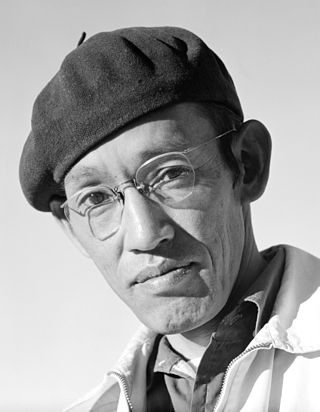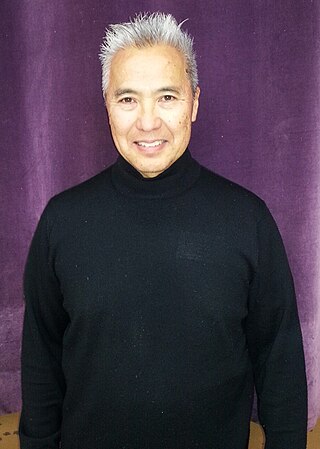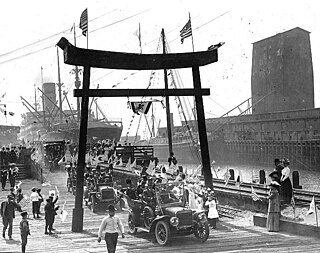
Manzanar is the site of one of ten American concentration camps, where more than 120,000 Japanese Americans were incarcerated during World War II from March 1942 to November 1945. Although it had over 10,000 inmates at its peak, it was one of the smaller internment camps. It is located at the foot of the Sierra Nevada mountains in California's Owens Valley, between the towns of Lone Pine to the south and Independence to the north, approximately 230 miles (370 km) north of Los Angeles. Manzanar means "apple orchard" in Spanish. The Manzanar National Historic Site, which preserves and interprets the legacy of Japanese American incarceration in the United States, was identified by the United States National Park Service as the best-preserved of the ten former camp sites.
Yamatai is a student-run taiko drumming team at Cornell University. Based in Cornell's Lincoln Hall, they perform for several events on campus and in the northeast region of the United States.

Tōyō Miyatake was a Japanese American photographer, best known for his photographs documenting the Japanese American people and the Japanese American internment at Manzanar during World War II.

Jeanne Wakatsuki Houston is an American writer. Her writings primarily focus on ethnic identity formation in the United States of America. She is best known for her autobiographical novel Farewell to Manzanar that narrates her personal experiences in World War II internment camps.
Stand Up For Justice: The Ralph Lazo Story (2004) is an educational narrative short film, co-produced by Nikkei for Civil Rights and Redress (NCRR) and Visual Communications (VC).
Shoji Kameda is a fourth-generation Japanese American musician and composer, and leading player of North American taiko. He is a founder and member of On Ensemble, a contemporary taiko quartet, and a former member of the jazz fusion group Hiroshima.

Kenny Endo is an American musician and taiko master. He is the leader of several taiko ensembles and regularly tours, performing traditional and contemporary taiko music. Endo is also the first non-Japanese national to receive a natori in the field of hogaku hayashi, Japanese classical drumming. Today Endo composes his own music and plays taiko professionally as a solo artist, with his ensembles, and in collaboration with other artists.
Kristofer Bergstrom is a leading North American taiko player. He is a former member of Los Angeles-based taiko quartet, On Ensemble. In addition to taiko, Bergstrom plays the shamisen, koto, and turntable.
Stanford Taiko is a collegiate taiko group based at Stanford University. One of the first collegiate taiko groups to form in North America, it was founded in the winter of 1992 by students Ann Ishimaru and Valerie Mih as a way to share taiko with the university community. As the founding organization of the Intercollegiate Taiko Invitational, Stanford Taiko has been instrumental in the development of collegiate taiko throughout the United States, as well as the larger North American taiko community through performing at the Taiko Jam of the North American Taiko Conference. Since 2000, the group has been active in the international scene through tours and exchange concerts in countries such as Japan, China, and Thailand.
Denver Taiko is the fourth taiko group founded in North America and the first taiko ensemble outside of California, United States. The group has a close partnership with the Tri-State Denver Buddhist Temple and performs throughout Colorado and neighboring states. In 2001, Denver Taiko received the Excellence in the Arts Award from Denver Mayor Wellington Webb. Today, Denver Taiko is an ensemble of third, fourth, and fifth generation Japanese Americans with a shared interest in honoring their Japanese American cultural heritage.

Portland Taiko is a kumidaiko performance group based in Portland, Oregon, United States. Kumidaiko is the Japanese art form of ensemble drumming, also well known as "taiko", the Japanese word for drum. Portland Taiko was created in early 1994 by Ann Ishimaru and Zack Semke, both charter members of Stanford Taiko, Kyle Kajihiro, Valerie Otani, Kenji Spielman, and June Arima Schumann. Portland Taiko is an active organization to the present day and maintains professionalism in national performance tours, workshops, educational and community outreach and innovation in taiko playing. Portland Taiko is one of the only large taiko groups in the Pacific Northwest, with their closest counterpart being Seattle Kokon Taiko in Seattle, Washington.
Kinnara Taiko is a Japanese American drumming ensemble based out of Senshin Buddhist Temple in Los Angeles, USA. They began playing taiko in 1969 when a few third-generation Japanese Americans gathered after an Obon festival and had an impromptu experimental session on an odaiko drum.

There is a population of Japanese Americans and Japanese expatriates in Greater Seattle, whose origins date back to the second half of the 19th century. Prior to World War II, Seattle's Japanese community had grown to become the second largest Nihonmachi on the West Coast of North America.

Ralph Lazo was the only known non-spouse, non-Japanese American who voluntarily relocated to a World War II Japanese American internment camp. His experience was the subject of the 2004 narrative short film Stand Up for Justice: The Ralph Lazo Story.
Don Nakanishi was a professor and director of the Asian American Studies Center at the University of California, Los Angeles. Nakanishi is known for establishing Asian American Studies as a "viable and relevant field of scholarship."

Sōta Fujii is a Japanese professional shogi player ranked 9-dan. He is the current holder of the Eiō, Kisei, Ōi, Ōshō, Ryūō, Kiō and Meijin titles. He is the youngest person to be awarded professional status by the Japan Shogi Association and one of only five players to become professional while still a junior high school student.
Mary Kageyama Nomura is an American singer of Japanese descent who was relocated and incarcerated for her ancestry at the Manzanar concentration camp during World War II and became known as The songbird of Manzanar.

Yuki Helen Okinaga Hayakawa Llewellyn was an American child survivor of the Japanese internment process during World War II. A 1942 photograph of her sitting on her mother's luggage became an iconic image of the era. In adulthood, Llewellyn was assistant dean of students at the University of Illinois, and frequently spoke on her childhood experience of displacement and incarceration.
Frank Fujio Chuman is a Japanese-American former civil rights attorney and author, involved in several important Japanese American civil rights cases and in the redress movement.








